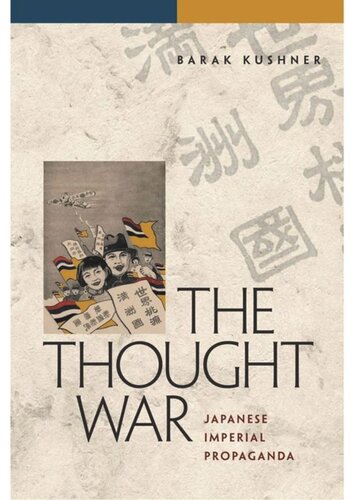

Most ebook files are in PDF format, so you can easily read them using various software such as Foxit Reader or directly on the Google Chrome browser.
Some ebook files are released by publishers in other formats such as .awz, .mobi, .epub, .fb2, etc. You may need to install specific software to read these formats on mobile/PC, such as Calibre.
Please read the tutorial at this link: https://ebookbell.com/faq
We offer FREE conversion to the popular formats you request; however, this may take some time. Therefore, right after payment, please email us, and we will try to provide the service as quickly as possible.
For some exceptional file formats or broken links (if any), please refrain from opening any disputes. Instead, email us first, and we will try to assist within a maximum of 6 hours.
EbookBell Team

5.0
30 reviews"A major contribution both to the study of Japan and propaganda in the twentieth century. Barak Kushner meticulously and convincingly reveals the full scope of what was assumed to not have existed; namely an organized, multifaceted, and disturbingly resilient system of Japanese propaganda. Based on an impressive array of primary sources, many only recently uncovered, The Thought War provides a fascinating assessment of the complex and often contradictory processes of Japanese propaganda in an imperial context." —Michael Baskett, professor of film studies, University of Kansas
"Barak Kushner has written a first-rate study of propaganda in Japan during the Second World War. In a work of painstaking research, he takes his readers into the heart of wartime Japan, building a compelling argument that Japanese propaganda was sophisticated and effective in rallying the population and, after the war, seamlessly redirecting it to aid the transformation of Imperial Japan into the post-war democracy of today. The Thought War is a superbly competent piece of research that floods light into a place where only generalization, supposition, and stereotype had existed before." —Nicholas J. Cull, University of Southern California, editor, Propaganda and Mass Persuasion: A Historical Encyclopedia, 1500–present
"The Thought War is a unique and remarkable study. Barak Kushner reveals that Japanese propaganda during World War II was astonishingly sophisticated, diverse, and effective. What’s more, the methods, messages, and makers of wartime propaganda proved just as successful at shaping public opinion in the wake of Japan’s defeat as they earlier had been in mobilizing the nation for war. Kushner’s insights on Japan’s path from empire, through war, and into postwar reconstruction are provocative, compelling, and thoroughly convincing." —William M. Tsutsui, chair of the Department of Asian Studies, University of Kansas
The Thought War is the first book in English to examine the full extent of Japan’s wartime propaganda. Based on a wide range of archival material and sources in Japanese, Chinese, and English, it explores the propaganda programs of the Japanese government from 1931 to 1945, demonstrating the true scope of imperial propaganda and its pervasive influence, an influence that is still felt today. Contrary to popular postwar rhetoric, it was not emperor worship or military authoritarianism that led an entire nation to war. Rather, it was the creation of a powerful image of Japan as the leader of modern Asia and the belief that the Japanese could and would guide Asia to a new, glorious period of reform that appealed to imperial subjects.
Kushner analyzes the role of the police and military in defining socially acceptable belief and behavior by using their influence to root out malcontents. His research is the first of its kind to treat propaganda as a profession in wartime Japan. He shows that the leadership was not confined to the crude tools of sloganeering and government-sponsored demonstrations but was able instead to appropriate the expertise of the nation’s advertising firms to "sell" the image of Japan as Asia’s leader and modernizer. In his exploration of the propaganda war in popular culture and the entertainment industry, Kushner discloses how entertainers sought to bolster their careers by adopting as their own pro-war messages that then filtered down into society and took hold. Japanese propaganda frequently conflicted with Chinese and American visions of empire, and Kushner reveals the reactions of these two nations to Japan’s efforts and the meaning of their responses.